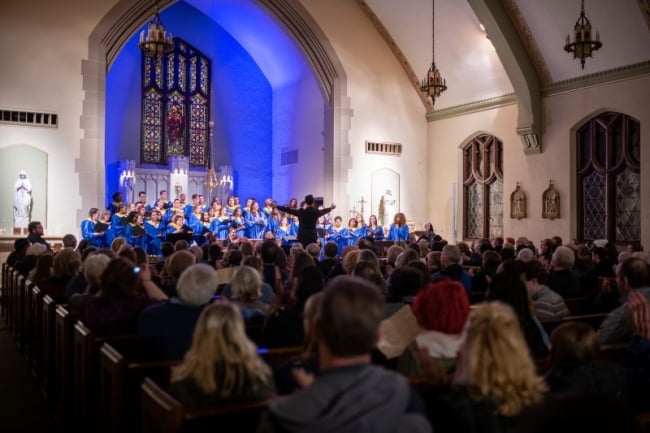You have /5 articles left.
Sign up for a free account or log in.

Students attend a choral concert in the Christ the King Chapel at Notre Dame College in Ohio.
Dave Hall
Notre Dame College in Ohio is on the brink of losing its formal ties to a religious order that allows the institution to call itself Catholic under canon law. The Sisters of Notre Dame, the order of nuns that founded the college in 1922, announced earlier this year that they’re severing their official connection with the institution at the end of June. As orders of nuns and priests shrink, a growing number of Catholic colleges have lost, or risk losing, sponsorships by them and find themselves left with hard decisions about how to remain tied to the Catholic Church.
A statement from the Sisters of Notre Dame explained that its nuns are aging and no longer have the capacity to be the formal guardians of the college’s Catholic values. The statement noted that 87 percent of the nuns are now age 70 or older, and the median age of the order is 78. The order sponsors multiple K-12 schools, but Notre Dame College is the only higher ed institution under its auspices.
“Over the past 33 years, our sisters have gradually withdrawn from the Board and leadership positions at the College in the face of the increasing complexities of higher education and as fewer sisters with appropriate training and expertise were available to serve at the institution,” the statement read. “Today, with little remaining experience in higher education, we are no longer equipped to meet our canonical obligations as a sponsor of the College … This decision is consistent with our long-term planning to ensure our mission and ministries continue despite our aging population.”
College leaders now have to decide if the college can retain its Catholic identity by finding another religious order to sponsor it, seek direct sponsorship from the local diocese or join a group of higher ed institutions that already has approved sponsorship from the Vatican. Alternatively, it could give up its formal status as a Catholic college but continue to embrace Catholic values. For now, the college has a letter from the local bishop affirming its Catholic status until it finds a more permanent solution.
“Since we were sponsored by the Sisters of Notre Dame, and their relationship is directly to Rome, we have kind of a direct descendancy … that allows us to say we’re Catholic with a big ‘C,’” said J. Michael Pressimone, president of Notre Dame College. “Really, for us, it’s a question about ethos and identity. What is it about our Catholic identity that informs how we see our work in the world today?”
He noted that the move won’t change much on campus day to day. The Sisters of Notre Dame have been less involved in the college’s affairs since 1990, when they passed off governance duties to an independent Board of Trustees, predominantly made up of lay leaders. The sisters also transferred ownership of all campus property to the college in 2008 and have offered minimal financial support in recent years. The college still can’t sell property or go into significant debt without the order’s permission, however, and the sisters are responsible for ensuring the college adheres to the order’s values.
Religiously affiliated colleges and universities vary vastly in how involved their founding churches or religious orders are in the routine functioning of institutions. For example, Brigham Young University is operated by leaders of the Church of Jesus Christ of Latter-day Saints, which subsidizes tuition and provides significant financial support. Some churches exercise authority over appointing and terminating trustees or dictate college policies, while others take a more hands-off approach.
Pressimone, who wrote his doctoral dissertation on Catholic sponsorship transitions, says some Catholic colleges retained strong ties to their sponsoring religious orders. For example, Benedictine College still has an abbey for Benedictine monks on campus. But the presence of nuns and priests on many Catholic campuses has dwindled as religious orders age and memberships decline. They’ve also taken a step back since Vatican II, the ecumenical council of the Catholic Church in the 1960s, emphasized the importance of expanding lay leadership. As laypeople stepped up to take on more college leadership roles, some religious orders shifted their attention away from governing these institutions.
“In the ’70s and ’80s, most of our institutions went from complete control by sisters, brothers and priests to initiating the first lay boards,” which included but weren’t entirely run by religious order members, Pressimone said. From then until today, their numbers on campuses have “diminished, declined or disappeared.” Only two Sisters of Notre Dame still work at the college.
Even though the loss of sponsorship will have little practical effect on student life, sponsorship still holds meaning to students, staff members and alumni. College leaders held five listening sessions on campus this spring semester to discuss the issue, and Catholics and non-Catholics alike overwhelmingly advocated for the institution to retain its official connection to the Catholic Church, Pressimone said.
The student body used to be majority Catholic and now isn’t, but “they sense that the spiritual dimension of the institution, and how we see our students through our internal lens of faith, is something that’s important to people,” he said. Undergraduates are currently required to take courses in theology, ethics and philosophy, and new employees have a yearlong orientation that teaches them about the Catholic intellectual tradition and social teachings.
He added that the college’s official Catholic identity also makes him feel like he has permission to express his own beliefs as a campus leader.
For example, “I can … talk about why we need to do something to end gun violence in America, without fear of repercussions politically for that, because it’s well within what we consider to be Catholic social teachings,” he said. “I can look at my students and I say, ‘Look, I see each of you as a unique and beautiful creation of a loving God.’ It’s a part of the ethos of the place. We’re not proselytizing … but we want them to graduate with a greater sense that there’s something more to life than just the work they’re going to do when they leave here.”
Laura Koehl, executive director of the Sisters of Notre Dame USA National Sponsorship and Network Office, said the nuns’ influence will continue at Notre Dame even after their sponsorship ends.
“As they go through these transitions as many other congregations are doing, that mission continues on, whether or not the sisters are actively involved,” she said. “In many ways, it continues on in the people who have experienced it, the graduates of the college, the graduates of our other educational institutions.”
A Growing Trend
The Reverend Dennis Holtschneider, president of the Association of Catholic Colleges and Universities, said Notre Dame is among a handful of Catholic colleges that have lost their sponsorships and sought alternative links to the church, but he expects many more institutions to follow. He noted that about 90 percent of Catholic colleges are connected to the church through sponsorships by religious orders, and the roughly 10 percent remaining are sponsored by their local diocese. Meanwhile, the numbers of priests and nuns has been dropping since the 1970s, he said.
“Many of these religious orders are finding that they can no longer be an active partner with the organizations they founded,” he said.
He added that while the trend is new in higher ed, most Catholic hospitals have already lost their original sponsors. Several Catholic universities, including Fontbonne University in Missouri and Walsh University in Ohio, have already gone through a sponsorship transition and had to find alternative options to hold on to their Catholic identities.
Mount St. Joseph University in Ohio is currently going through this process after its sponsor, the Sisters of Charity of Cincinnati, announced plans to drop all of its sponsored ministries last September because of the order’s decreasing numbers and aging population. The religious order, however, will continue sponsorship until the university finds another option to retain its Catholic status, said Paige Ellerman, general counsel and vice president of compliance, risk and legal affairs at Mount St. Joseph.
Under the university’s sponsorship agreement, up to four sisters sit on the Board of Trustees, and the order has to approve the appointment of new trustees, the hiring of presidents, the annual operating budget and debts above a certain threshold, among other decisions. The nuns no longer teach there and aren’t involved in day-to-day operations, but the order is based across the street from campus and has kept strong ties with the university, Ellerman said. One of the nuns is on the university’s sponsorship transition committee.
Students, employees and alumni “had a lot of questions about what this meant for the culture of our university, why this was happening and what our plans were for the future because of the very close connection that our community has with the Sisters of Charity of Cincinnati,” Ellerman said.
The Board of Trustees hired a canon lawyer to help them weigh their options and has ultimately decided to join an existing group of Catholic higher ed institutions that have sponsorship or create its own such group.
“The Board has decided we do in fact want to remain Catholic and that we want to remain consistent with the mission, vision and values of the Sisters of Charity of Cincinnati,” Ellerman said. “The Sisters of Charity are walking hand in hand with us through the process, and that’s really important to our community.”
Holtschneider noted that on some campuses, there’s a real sense of loss when sponsors cut ties.
“These schools love the sisters who were part of the school all those years,” he said. “They generally love the priests. They’re sorry to see this day come, because these sisters have given a heart to the school and given a culture and a mission to the school, and people love to be part of that work. These were beautiful relationships … and that day is starting to close.”
Notre Dame is “not a one-off,” he said. “It’s one of the early schools that’s going to lead the way.”


.png)





.jpg?itok=SMtcLEhK)
